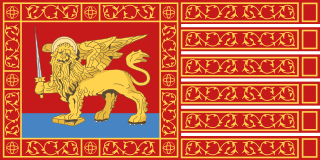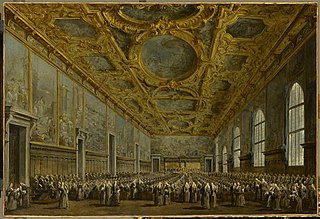Related Research Articles

The Doge of Venice was the highest role of authority within the Republic of Venice. The word Doge derives from the Latin Dux, meaning "leader," originally referring to any military leader, becoming in the Late Roman Empire the title for a leader of an expeditionary force formed by detachments from the frontier army, separate from, but subject to, the governor of a province, authorized to conduct operations beyond provincial boundaries.

The Republic of Venice, traditionally known as La Serenissima, was a sovereign state and maritime republic with its capital in Venice. Founded, according to tradition, in 697 by Paolo Lucio Anafesto, over the course of its 1,100 years of history it established itself as one of the major European commercial and naval powers. Initially extended in the Dogado area, during its history it annexed a large part of Northeast Italy, Istria, Dalmatia, the coasts of present-day Montenegro and Albania as well as numerous islands in the Adriatic and eastern Ionian seas. At the height of its expansion, between the 13th and 16th centuries, it also governed the Peloponnese, Crete and Cyprus, most of the Greek islands, as well as several cities and ports in the eastern Mediterranean.

The Council of Ten, or simply the Ten, was from 1310 to 1797 one of the major governing bodies of the Republic of Venice. Elections took place annually and the Council of Ten had the power to impose punishments upon patricians. The Council of Ten had a broad jurisdictional mandate over matters of state security. The Council of Ten and the Full College constituted the inner circle of oligarchical patricians who effectively ruled the Republic of Venice.

Tito Livio Frulovisi was a humanist scholar and author, who is best known for his biography of King Henry V of England in Latin, the Vita Henrici Quinti.

Jacopo Tiepolo, also known as Giacomo Tiepolo, was Doge of Venice from 1229 to 1249. He had previously served as the first Venetian Duke of Crete, and two terms as Podestà of Constantinople, twice as governor of Treviso, and three times as ambassador to the Holy See. His dogate was marked by major domestic reforms, including the codification of civil law and the establishment of the Venetian Senate, but also against a mounting conflict with Emperor Frederick II, which broke into open war from 1237 to 1245.

The Great Council or Major Council was a political organ of the Republic of Venice between 1172 and 1797. It was the chief political assembly, responsible for electing many of the other political offices and the senior councils that ran the Republic, passing laws, and exercising judicial oversight. Following the lockout of 1297, its membership was established on hereditary right, exclusive to the patrician families enrolled in the Golden Book of the Venetian nobility.
Pietro Cesare Alberti (1608–1655) — later Peter Caesar Alburtus — was a Venetian immigrant to the Dutch colony of New Amsterdam, commonly regarded as the first Italian American settler at least in what is now New York State.

The Minor Council or Ducal Council was one of the main constitutional bodies of the Republic of Venice, and served both as advisors and partners to the Doge of Venice, sharing and limiting his authority.

Bernardo Bembo was a Venetian humanist, diplomat and statesman. He was the father of Pietro Bembo.

Girolamo Donato, also spelled Donati, Donado or Donà, was a Venetian diplomat and humanist. He made important translations of ancient Greek philosophy and the Greek Fathers into Latin. He served the Republic of Venice on embassies abroad on twelve separate occasions, most importantly at Rome four times, and also served as a governor of Ravenna (1492), Brescia (1495–97), Cremona (1503–04) and Crete (1506–08).

Niccolò Sagundino was a Greek-born Venetian secretary, diplomat and humanist. He wrote numerous letters, as well as religious and philosophical treatises, mostly in Latin.
Filippo Morandi, usually known as Filippo da Rimini, was a humanist, teacher, writer and administrator in the Republic of Venice.

The Venetian patriciate was one of the three social bodies into which the society of the Republic of Venice was divided, together with citizens and foreigners. Patrizio was the noble title of the members of the aristocracy ruling the city of Venice and the Republic. The title was abbreviated, in front of the name, by the initials N.H., together with the feminine variant N.D.. Holding the title of a Venetian patrician was a great honour and many European kings and princes, as well as foreign noble families, are known to have asked for and obtained the prestigious title.
Teofilo Zeno was a 13th-century Venetian nobleman and administrator.
The grand chancellor was one of the most senior offices in the Republic of Venice. Alone among the senior magistracies, which were reserved for the Venetian patriciate, it was held by common citizens.
Zaccaria Barbaro was a Venetian statesman and diplomat.

Paolo Barbo (1416–1462) was a Venetian patrician, diplomat and statesman. An educated humanist of the well connected Barbo and Condulmer families, he was the nephew of Pope Eugene IV and the brother of Pope Paul II.

Niccolò Barbo was a Venetian patrician, official and Renaissance humanist.
Giovanni Dario was a Venetian official who served multiple times as ambassador of the Republic of Venice. His family hailed from Crete, a Venetian colony at the time; his knowledge of Greek allowed him to serve as interpreter and envoy to Constantinople during the last years of the Byzantine Empire. After the Fall of Constantinople he rose to the position of secretary of the Duke of Crete, and from 1464 entered service with the Signoria of Venice. He was repeatedly sent as ambassador to the court of the Ottoman Empire and the Mamluk Sultanate, most notably helping conclude the First Ottoman–Venetian War in 1479.
Benintendi Ravegnani was a Venetian public secretary and diplomat, whose career culminated with the highest non-patrician office, that of grand chancellor, which he held from 1352 to his death in 1365. Prior to that, he was appointed to the post of vice grand chancellor in 1349. A humanist and friend of Petrarch, he was also a historian, continuing Andrea Dandolo's history of Venice.